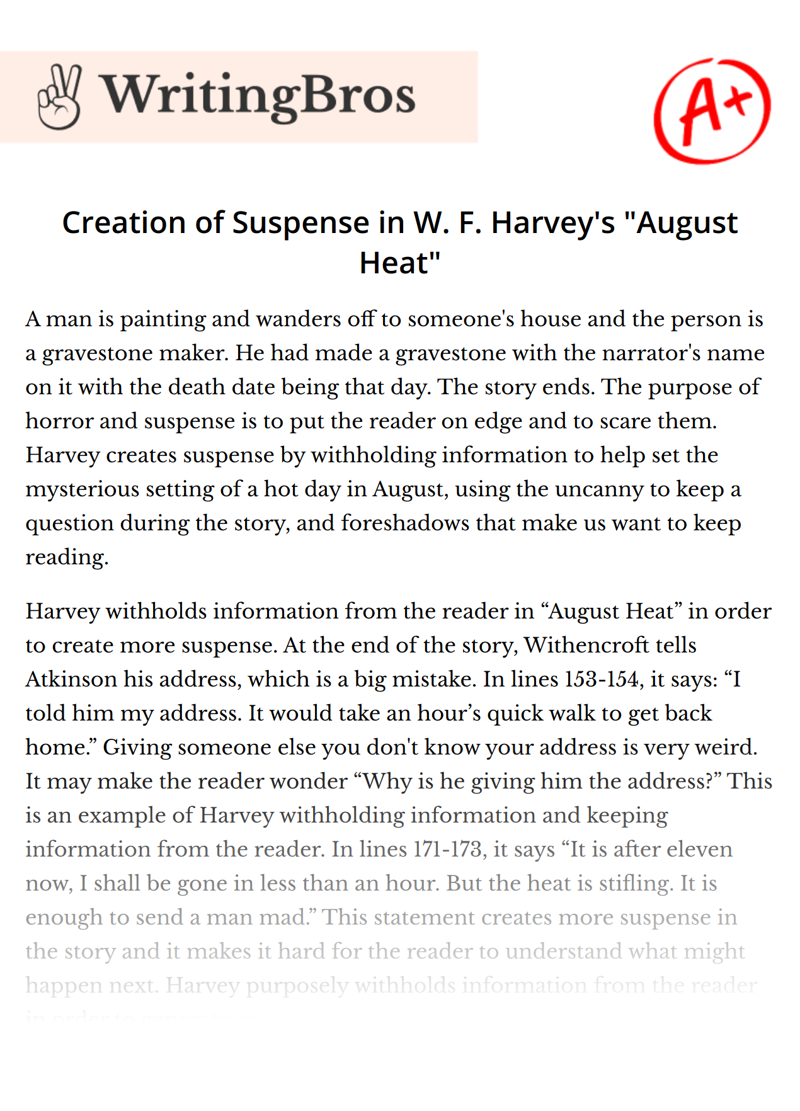Creation of Suspense in W. F. Harvey's "August Heat"

A man is painting and wanders off to someone's house and the person is a gravestone maker. He had made a gravestone with the narrator's name on it with the death date being that day. The story ends. The purpose of horror and suspense is to put the reader on edge and to scare them. Harvey creates suspense by withholding information to help set the mysterious setting of a hot day in August, using the uncanny to keep a question during the story, and foreshadows that make us want to keep reading.
Harvey withholds information from the reader in “August Heat” in order to create more suspense. At the end of the story, Withencroft tells Atkinson his address, which is a big mistake. In lines 153-154, it says: “I told him my address. It would take an hour’s quick walk to get back home.” Giving someone else you don't know your address is very weird. It may make the reader wonder “Why is he giving him the address?” This is an example of Harvey withholding information and keeping information from the reader. In lines 171-173, it says “It is after eleven now, I shall be gone in less than an hour. But the heat is stifling. It is enough to send a man mad.” This statement creates more suspense in the story and it makes it hard for the reader to understand what might happen next. Harvey purposely withholds information from the reader in order to generate more suspense in his story, “August Heat”.
The narrator paints an image in his head, and it's a man that is about to be sentenced to prison. He goes to monumental masons shop and feel weird. In line 63 He sees a man and notices “it was the man he had been drawing”. And after he notices that was the man that he had been painting, it states in lines 67-68 he was “smiling, as if they were old friends”. This is very weird because he has just seen the man that he had been drawing in his paintings. This puts the reader on edge and makes the readers question, “How does he know this man”, “Wasn't he just made up?” and “Why is he smiling at him like they are old friends?” These are a few great examples of the uncanny way that this was written to create suspense. Harvey purposely uses uncanny in order to generate more suspense in his story, “August Heat”. In “August Heat”, W.F. Harvey uses foreshadowing in order to create more suspense.
The narrator mentions the heat in this story a lot. In lines 17-18, The story says “The room, though the doors and windows were open, was oppressively hot.” He continues to mention the heat in the story, and it makes the reader question, “Why is this a big deal?” It makes the reader want to read on and see what happens next. Harvey also makes suspense with the graveston that the narrator looks at whiles he is at Masons house. In lines 101-110, Harvey states “SACRED TO THE MEMORY OF JAMES CLARENCE WITHENCROFT BORN JAN. 18, 1860 HE PASSED AWAY VERY SUDDENLY ON AUGUST 20th, 190- “In the midst of life we are in death.” The person reading doesn't know why there is a gravestone for Harvey, and why the death date is that exact same date. This makes the reader want to continue reading to find out. Harvey uses foreshadowing in the story “August Heat” in order to create more suspense.
Harvey creates suspense by withholding information to help set the mysterious setting of a hot day in August, using the uncanny to keep a question during the story, and foreshadows that make the reader want to continue reading and see what happens. These three elements are used to create suspense, because it makes the reader ask questions, and it makes them want to finish the book right then if they could. Readers like to do this so they can answer the unanswered questions that they have. People enjoy horror stories because they can be thrilling and they can be very interesting. Horror stories thrive because people love the feeling of suspense, adrenaline, and they can also connect with the readers deepest fears.
Cite this Essay
To export a reference to this article please select a referencing style below

